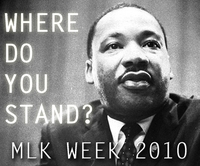MLK Week Educational Workshops Confirmed
01/13/10
Contributed by Doreen Hettich-Atkins
 Don't miss this exciting slate of workshops for MLK Week. Topics include a Talking Circle on Race and Racism, a discussion of Modern Day Abolitionism, information about the building of a community memorial to remember the men lynched by a mob in the 1920s in Minnesota, a discussion of the IC Climate Action Plan, and a discussion with President Rochon entitled "Comfort and Challenge in 2010".
Don't miss this exciting slate of workshops for MLK Week. Topics include a Talking Circle on Race and Racism, a discussion of Modern Day Abolitionism, information about the building of a community memorial to remember the men lynched by a mob in the 1920s in Minnesota, a discussion of the IC Climate Action Plan, and a discussion with President Rochon entitled "Comfort and Challenge in 2010".
For more information, keep reading or visit the MLK Website for information about all of the exciting activities planned to celebrate the life and legacy of Dr. Martin Luther King Jr. as we challenge the campus community to think about "Where Do You Stand?"
Tuesday, January 26, 2010
12:10-1:00pm Clark Lounge
Talking Circle on Race and Racism
Sponsored by the Diversity Awareness Committee
Facilitated by Stephanie Baptist and Elizabeth Field from the Multicultural Resource Center
The Talking Circle is a frank, respectful dialogue that provides participants with an opportunity for self-reflection, sharing experiences, and influencing each others' perspectives and attitudes. Talking Circles on Race & Racism normally run over a five-week course. In the hour that we have together we will merely begin a dialogue on issues of racial identity, what is race, and how race and racism materialize on campus. Students will have a chance to share their perspectives in a safe setting and we ask that confidentiality is honored.
Tuesday, January 26, 2010
12:15-1:00pm Klingenstein Lounge
Modern Day Abolitionism
Presented by: Laura Murphy, Assistant Professor, English
This session will introduce participants to the issue of modern day slavery and the work we can do to eradicate it. Through short videos and slides of the abolitionist work that is being done on the ground all over the world today, participants will learn that slavery and abolition still exist and they too must take a stand. Dr. King’s notion that we must be active participants in the struggle for equality if we expect radical change in the world encourages us to invest our own personal efforts against slavery in all its forms. In fact, it is perhaps in times of our own greatest comfort that we can know what kind of neighbor we actually are to those who do not enjoy the comforts we do.
Thursday, January 28, 2010
12:15-1:00pm Klingenstein Lounge
Difficult to Speak and Impossible to Remain Silent
Presented by: Carla Stetson, Assistant Professor, Art
In 1920, three black men were lynched by a mob numbering in the thousands in Duluth, Minnesota. This session gives the history and political process as well as the creative process of the making of a community memorial to remember those victims eighty-three years later. The Memorial is designed with quotes from diverse writers to engender dialogue about taking a stand against racism in all forms, when and where it occurs. The Memorial was designed by Professor Stetson.
Thursday, January 28, 2010
12:15-1:00pm Clark Lounge
The Ithaca College Climate Action Plan
Presented by: Marian Brown
This brief presentation of the IC Climate Action Plan will be followed by a workshop that will identify at least 3 near-term actions that participants can take to help implement the plan or to get more involved in implementation. Climate change is a pressing issue for all of society. It is a social justice issue because the poorest countries are being affected the most, even though they are least responsible for the threat. It is a pressing issue because climate change legislation is currently being hashed out at the national level in the Senate (a strong bill has already passed the House). What limits most people from being more vocal about this issue is lack of understanding of the science and of the real threats to our daily lives. This workshop will illustrate the science and the threats and compel the audience to take a stand on the issue and take action before legislation is passed (or not) in the Senate.
Tuesday, February 2, 2010
12:15-1:00pm Klingenstein Lounge
Comfort and Challenge in 2010
Presented by: Thomas Rochon, President
We celebrate MLK today for his stand on issues that were controversial at the time, but matters of comfort and consensus today (e.g. integration, equal opportunity). Through group work, I will ask students to identify issues of challenge in 2010. We will discuss who has been taking a stand on those issues and the ways in which they have done so. The larger point to understand is that social change/struggle for social justice is a constant process—a fact that can be blurred when we look at yesterday’s struggles.
0 Comments
https://www.ithaca.edu/intercom/article.php/20100113143951721
 Don't miss this exciting slate of workshops for MLK Week. Topics include a Talking Circle on Race and Racism, a discussion of Modern Day Abolitionism, information about the building of a community memorial to remember the men lynched by a mob in the 1920s in Minnesota, a discussion of the IC Climate Action Plan, and a discussion with President Rochon entitled "Comfort and Challenge in 2010".
Don't miss this exciting slate of workshops for MLK Week. Topics include a Talking Circle on Race and Racism, a discussion of Modern Day Abolitionism, information about the building of a community memorial to remember the men lynched by a mob in the 1920s in Minnesota, a discussion of the IC Climate Action Plan, and a discussion with President Rochon entitled "Comfort and Challenge in 2010".